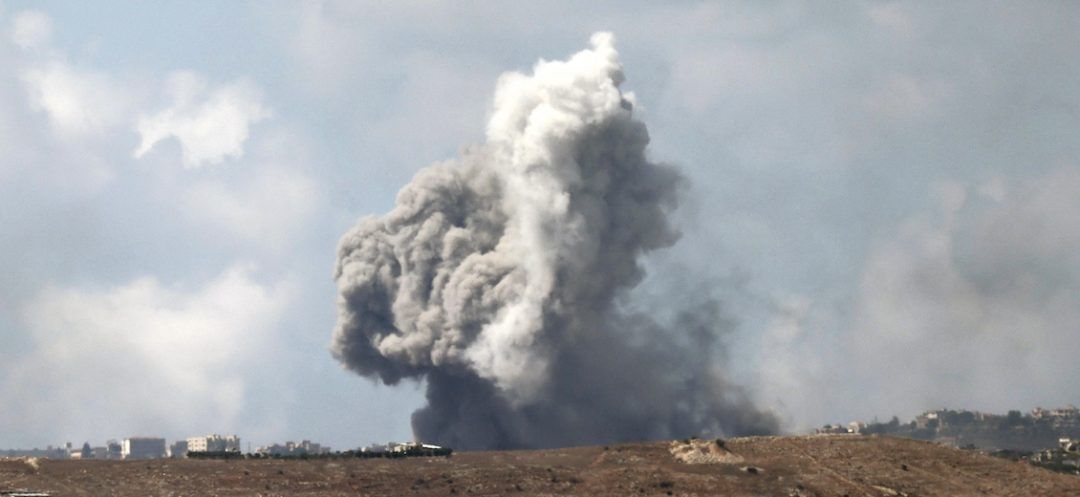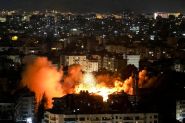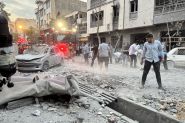- Home
- War in the Middle East
- Israeli Strikes Continue Throughout the Night

©(JALAA MAREY/AFP)
Israeli raids continued through Monday night into the early hours of the morning, with planes targeting the outskirts of Tyre after striking Maarak and al-Hoch overnight.
The raids also affected towns and villages in the Baalbek caza, including three strikes on Baalbek, Douris, and Bazalia, as well as assaults on Nabi Chit and Bodai. The town of Baalbek was hit from all sides, including Ras al-Ain, Asseira, Charawina, Tall Abyad, and Kayyal.
The bombardments also hit Khodr, Nabi Chit, Soufri, Temnin, Hilaniyé, Bednayel, Taraya, Younin, Chmestar, Hlebta, Hrebta, Al-Aïn, Nabi Othman.
Residents of the affected areas moved to more remote areas, and some mosques in Baalbeck-Hermel opened their doors to accommodate the displaced.
Hospitals in the region took in the injured and the dead.
Israeli media reported this morning that sirens were sounding in northern Israel, warning of incoming rocket fire from Lebanon towards several towns and communities.
Alerts were heard in communities and towns in the Galilee and near Haifa, where people were seen running for cover when air raid sirens sounded.
For its part, Hezbollah announced in a series of communiqués that it had bombarded the Meggido military airport to the west of Afula three times in a row at dawn on Tuesday, with salvos of Fadi 1 and Fadi 2 rockets.
The pro-Iranian group also claimed to have targeted an explosives factory in the Zakhroun region, 60 km inside Israel, with a salvo of Fadi 2 rockets.
They also targeted the Ramat David base and airport with a salvo of Fadi 2 rockets.
According to Israeli media reports, Benjamin Netanyahu told his Council of Ministers that his aim is to dissociate the Lebanon and Gaza fronts. He also said that military pressure on Hezbollah leader Hassan Nasrallah could encourage a (prisoner) exchange agreement.
Israeli air strikes on Lebanon killed at least 492 people on Monday, including 35 children, the Health Ministry said, marking the deadliest day of cross-border violence since the Gaza war began.
Arab states strongly condemned Israel for the escalating hostilities with Hezbollah, which have intensified to levels unseen in nearly a year.
Israel said it killed a “large number” of Hezbollah militants when it hit about 1,600 sites in southern and eastern Lebanon, including a “targeted strike” in Beirut in what the Israeli army called “Operation Northern Arrows”.
Hezbollah said Ali Karake, its third-in-command, was alive and had moved to safety after a source said the strike on the capital targeted him.
“We sleep and wake up to bombardment… that’s what our life has become,” said Wafaa Ismail, 60, a housewife from the southern village of Zawtar.
Global powers urged Israel and Hezbollah to step back from the brink of all-out war, as the violence shifted from Israel’s southern border with Gaza to its northern frontier with Lebanon.
France and Egypt called on the United Nations Security Council to intervene, while Iraq requested an urgent meeting of Arab states on the sidelines of the UN General Assembly in New York.
Israeli army chief Herzi Halevi said the strikes hit combat infrastructure Hezbollah had been building for two decades.
Israeli Defense Minister Yoav Gallant called Monday “a significant peak” in the operation.
“This is the most difficult week for Hezbollah since its establishment –- the results speak for themselves,” he said.
“Entire units were taken out of battle as a result of the activities conducted at the beginning of the week in which numerous terrorists were injured.”
Prime Minister Benjamin Netanyahu said Israel was acting to change the “security balance” in the north.
The raids also affected towns and villages in the Baalbek caza, including three strikes on Baalbek, Douris, and Bazalia, as well as assaults on Nabi Chit and Bodai. The town of Baalbek was hit from all sides, including Ras al-Ain, Asseira, Charawina, Tall Abyad, and Kayyal.
The bombardments also hit Khodr, Nabi Chit, Soufri, Temnin, Hilaniyé, Bednayel, Taraya, Younin, Chmestar, Hlebta, Hrebta, Al-Aïn, Nabi Othman.
Residents of the affected areas moved to more remote areas, and some mosques in Baalbeck-Hermel opened their doors to accommodate the displaced.
Hospitals in the region took in the injured and the dead.
Israeli media reported this morning that sirens were sounding in northern Israel, warning of incoming rocket fire from Lebanon towards several towns and communities.
Alerts were heard in communities and towns in the Galilee and near Haifa, where people were seen running for cover when air raid sirens sounded.
For its part, Hezbollah announced in a series of communiqués that it had bombarded the Meggido military airport to the west of Afula three times in a row at dawn on Tuesday, with salvos of Fadi 1 and Fadi 2 rockets.
The pro-Iranian group also claimed to have targeted an explosives factory in the Zakhroun region, 60 km inside Israel, with a salvo of Fadi 2 rockets.
They also targeted the Ramat David base and airport with a salvo of Fadi 2 rockets.
According to Israeli media reports, Benjamin Netanyahu told his Council of Ministers that his aim is to dissociate the Lebanon and Gaza fronts. He also said that military pressure on Hezbollah leader Hassan Nasrallah could encourage a (prisoner) exchange agreement.
Israeli air strikes on Lebanon killed at least 492 people on Monday, including 35 children, the Health Ministry said, marking the deadliest day of cross-border violence since the Gaza war began.
Arab states strongly condemned Israel for the escalating hostilities with Hezbollah, which have intensified to levels unseen in nearly a year.
Israel said it killed a “large number” of Hezbollah militants when it hit about 1,600 sites in southern and eastern Lebanon, including a “targeted strike” in Beirut in what the Israeli army called “Operation Northern Arrows”.
Hezbollah said Ali Karake, its third-in-command, was alive and had moved to safety after a source said the strike on the capital targeted him.
“We sleep and wake up to bombardment… that’s what our life has become,” said Wafaa Ismail, 60, a housewife from the southern village of Zawtar.
Global powers urged Israel and Hezbollah to step back from the brink of all-out war, as the violence shifted from Israel’s southern border with Gaza to its northern frontier with Lebanon.
France and Egypt called on the United Nations Security Council to intervene, while Iraq requested an urgent meeting of Arab states on the sidelines of the UN General Assembly in New York.
Israeli army chief Herzi Halevi said the strikes hit combat infrastructure Hezbollah had been building for two decades.
Israeli Defense Minister Yoav Gallant called Monday “a significant peak” in the operation.
“This is the most difficult week for Hezbollah since its establishment –- the results speak for themselves,” he said.
“Entire units were taken out of battle as a result of the activities conducted at the beginning of the week in which numerous terrorists were injured.”
Prime Minister Benjamin Netanyahu said Israel was acting to change the “security balance” in the north.
Read more



Comments